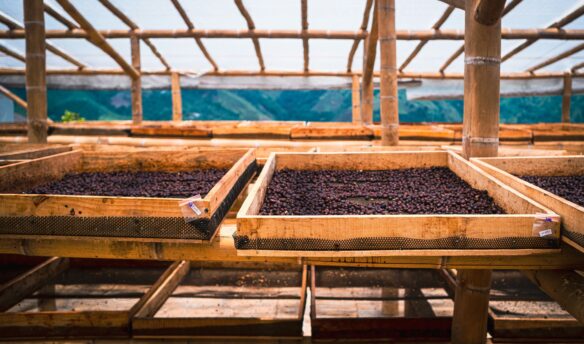Does coffee taste bitter to you? Blame your genes. Plus, rising coffee prices put pressure on emerging markets, and fungicides harm farmworkers in Brazil.
‘Coffee’s 94% Rally Finally Hits the Last Holdouts for Demand’ – via Bloomberg
Coffee prices went up drastically in 2024. Over the last year, the cost of arabica coffee on the commodity futures market increased 94%, and countless news outlets wrote stories about what this means for consumers.
And now, demand is finally beginning to decline in countries previously experiencing aggressive growth in coffee consumption.
As Dayanne Sousa, Eko Listiyorini, and Nguyen Dieu Tu Uyen report for Bloomberg, people in places like Vietnam, Brazil, and China that were once considered high-growth markets are buying less coffee. From importers to roasters to consumers, the buying slowdown has hit all parts of the supply chain.
“In Vietnam, industry groups are reporting that high prices are making some buyers hesitant to place large orders,” they write. “In Indonesia, some roasters are shifting to use lower grade beans. And shipments from top producer Brazil into China have slowed.”
Vietnam is the second-largest producer of robusta, and as you might guess, robusta prices have also risen to near-record levels. In response, farmers are holding back robusta beans in case prices continue to increase and they can earn more. Meanwhile, In Indonesia, domestic roasters are adding things like corn or roasted nuts to coffee blends to keep costs down.
China has increasingly been portrayed as the next big coffee-drinking market. Consumption in the country has grown on average by 21% every year over the past decade (compared to a world average of 1.8%). But that might be beginning to change.
The country’s “culture of coffee consumption is just at the beginning,” consultant Michael Von Luehrte said. “But, with the weakness in the economy we’ve seen over the past months, I do wonder if consumers will really spend more on coffee now and if the growth momentum continues.”
Read the full story here or via Yahoo! Finance here.
‘The Bitter Truth: Science Reveals Why Coffee Tastes Different to Everyone’ – via Study Finds
Coffee preferences are subjective, especially when it comes to bitterness. Some people love that bitter snap that lingers after every sip; for others, bitterness is to be avoided at all costs.
But what if we told you that your appreciation for bitterness could be genetic?
German researchers investigated a new bitter-causing coffee compound called mozambioside and discovered that a person’s perception of bitterness is connected to a specific gene receptor. In the study, published in Food Chemistry, the scientists looked at TAS2R43, a gene that codes for bitterness. About 20% of Europeans have a deletion in this gene, meaning they have fewer receptors and are less likely to taste bitterness in the same way as others.
Genetic tests on the 11 study participants revealed a wide range of different versions of TAS2R43—some were missing the gene completely, others partially, while just two had the gene completely intact. This affected how the volunteers tasted samples with mozambioside.
“Eight out of eleven test subjects perceived a bitter taste, one found it astringent, and two didn’t notice any particular taste,” Study Finds reports.
The study has limitations—it included just eleven participants and focused on European genetic variants. The study only looked at arabica coffee from Colombia, but the researchers hope it can influence future flavor and health research.
Bitter taste receptors exist elsewhere in the body. Research indicates these receptors could fight pathogens and help with metabolism regulation. The study, co-author Roman Lang said, is “an important milestone in flavor research, but also in health research. Bitter substances and their receptors have further physiological functions in the body, most of which are still unknown.”
More News
‘Value in the Spotlight as Competition Heats Up in £6.1bn UK Branded Coffee Shop Market’ – via World Coffee Portal
‘Bean-less Coffee Makes UK Debut’ – via Global Coffee Report
‘Violife Debuts Lentil-based Coffee Creamers in the US’ – via The Plant Base
‘Nominations Are Now Open For The 16th Annual Sprudgie Awards—” The Oscars of Coffee”’ – via Sprudge
‘Carlo Di Ruocco, the Original Mr. Espresso, Dies at 90’ – via Daily Coffee News
‘Should Customers Be Allowed To Bring Their Own Milk To A Cafe?’ – via Sprudge
The Week in Coffee Unionizing
Last Monday, unionized workers at three Blue Bottle Coffee shops in Boston, Massachusetts, walked off the job for exactly seven minutes and 59 seconds.
As Maddie Barron in the Berkeley Beacon reports, the workers were protesting alleged bad-faith bargaining by the company. They also sought to bring attention to the lack of guaranteed hours for staff after a unionized location was closed for renovations.
Blue Bottle asked workers at the closed location to either take a leave of absence or transfer to another fully-staffed cafe. Workers who moved said that the diluted tip pool had left many struggling to make ends meet. The specific work stoppage referred to the average $7.59 per hour in tips the workers had lost since their location closed.
“All the baristas here rely on tips for a sizable portion of their income,” said barista and organizer Piper Milliken, who referenced the high cost of living in Boston. Five Blue Bottle locations unionized in 2024, forming the Blue Bottle Independent Union. Since then, organizers allege the company has engaged in hostile behavior toward unionized baristas, including cutting hours and removing “know your rights” flyers.
“Blue Bottle has delayed negotiating over our core demands and most recently negotiated in bad faith with us over the recent closure of the Prudential location,” said BBIU president Rocky Prull. In response, the company told the Berkeley Beacon it was “dedicated to working in good faith” with the union and has committed to a meeting monthly with the union to negotiate a contract.
Is Coffee Good For You?
In this section, we usually go over research about coffee’s impact on the body. Most of the studies we’ve reviewed show that coffee is generally safe and can have positive health benefits—at least when you drink it.
But what about those who produce coffee?
Pesticides and other chemicals are routinely sprayed on coffee farms worldwide, many of which are harmful to the environment and the workers who handle them. New research in Brazil has found that a group of common fungicides used to fight coffee leaf rust can pose health risks to the workers who apply it.
Coffee leaf rust (CLR) is one of the most devastating diseases facing the coffee industry. Since it first appeared on coffee farms in the 19th century, CLR has spread to all coffee-producing regions and can be economically catastrophic for farmers.
There are several ways to try to prevent the disease and fight back once it takes hold. Researchers are investigating biological controls—such as beneficial insects or fungi—while producers are increasingly embracing disease-resistant cultivars and implementing soil management techniques. However, most farmers still rely on fungicides to deal with CLR.
The study, published in Science of the Total Environment, focused on three triazole fungicides commonly used throughout the coffee industry to combat CLR and other coffee plant diseases. The researchers found traces of the fungicides cyproconazole, epoxiconazole, and triadimenol in the urine of 140 farmworkers and their spouses in southern Minas Gerais state in Brazil, showing both occupational and environmental exposure. A control group of 50 urban residents of the state showed no exposure.
Most of the farmworkers tested showed chronic occupational exposure to the fungicides, ranging from a few years to upwards of five decades. Analysis of these results, the authors wrote, showed “potentially significant human health risk” from long-term exposure to the fungicides, particularly epoxiconazole. Triazole fungicides have been shown to disrupt the endocrine system, which creates and releases hormones to maintain various bodily functions such as metabolism and energy levels.
The study “provides evidence that people are at elevated risk of toxicity and that there is a need to develop better risk management strategies, such as setting up more training programs to help them understand the importance of using personal protective equipment and following fungicide usage directions,” co-author Nicole Kleinstreuer from the U.S. National Institute of Environmental Health Sciences said in a press release.
Beyond the Headlines
‘The Worker-Owned Coffee Cooperatives of Baltimore’ by Fionn Pooler
‘Brief History of the Arabica Genome’ by Tung Nguyen
‘Cold Comfort: Is Chilled Coffee Here to Stay?’ by Kathryn Lewis
















